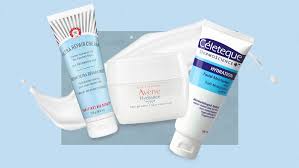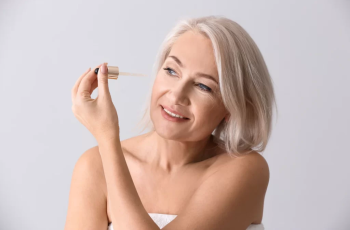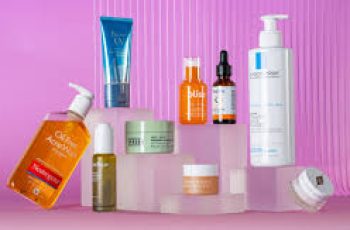
Moisturizers 101: Why Every Skin Type Needs One and How to Choose the Right Formula
When people think of moisturizers, they often assume they’re only necessary for those with dry or flaky skin.
In reality, moisturizing is a fundamental part of any healthy skincare routine—regardless of whether your skin is oily, dry, combination, sensitive, acne-prone, or somewhere in between.
Just like sunscreen and facial cleanser, a good moisturizer plays a crucial role in maintaining the health and resilience of your skin.
Beyond hydration, the right formula can help strengthen the skin barrier, soften fine lines, smooth uneven texture, and restore your skin’s youthful elasticity and glow.
But with the beauty market flooded with options—from lightweight gel-creams to thick nourishing balms—figuring out which moisturizer suits your skin type and concerns can be a bit overwhelming.
That’s why we’ve created this complete guide to facial moisturizers: how to use them, how to choose them, and what ingredients to look for based on your unique skin profile.
Why Moisturizing Is Essential for Every Skin Type
Moisturizers serve as a protective sealant that traps moisture in the skin and prevents transepidermal water loss (TEWL). But their benefits go far beyond hydration:
Strengthening the skin barrier: Moisturizers reinforce the outermost layer of the skin, helping it function as a protective barrier against environmental stressors like pollution and harsh weather.
Improving texture and tone: Regular hydration promotes smooth, plump skin, reducing the appearance of rough patches, dry spots, or dullness.
Enhancing product absorption: A properly moisturized face allows serums and treatments to penetrate more effectively.
Reducing irritation: Dry skin is often more reactive and prone to redness, flaking, or breakouts. Moisturizers help calm and stabilize the skin.
Slowing visible signs of aging: Hydrated skin looks younger, firmer, and more radiant. Moisturizers can also deliver targeted anti-aging ingredients like peptides, ceramides, or retinoids.
How (and When) to Apply Moisturizer
Let’s start with the application basics:
When to Apply
Moisturizer should be applied twice a day: once in the morning and once at night. Your morning formula should be lightweight, comfortable under sunscreen and makeup.
Your evening moisturizer can be slightly richer to help compensate for overnight water loss and support your skin’s natural repair processes.
Where in Your Routine
Moisturizer should be one of the final steps in your skincare routine—after cleansing, toning, serums, and treatments, but before sunscreen (in the morning) and before facial oil (if you use one at night).
How to Apply
Use a pea-sized amount—a little goes a long way.
Warm the product between your fingertips, then gently press and smooth it into the skin using upward, circular motions.
Avoid tugging or dragging the skin, especially in delicate areas like around the eyes.
If applying makeup afterward, let your moisturizer absorb fully for a few minutes to avoid pilling.
Choosing the Right Moisturizer for Your Skin Type
Not all moisturizers are created equal. Your skin type—along with any specific concerns like acne, aging, or hyperpigmentation—will determine which formula works best for you.
Below, we’ll walk you through the top picks and ingredients by skin type:
1. Oily Skin
Key challenges: Excess sebum, clogged pores, acne, shine
Common misconception: People with oily skin often skip moisturizer out of fear it will make their skin more greasy. However, oily skin can still be dehydrated, meaning it lacks water rather than oil. Skipping moisturizer can trigger the skin to produce even more oil to compensate, worsening the problem.
What to look for:
Lightweight gel or gel-cream textures
Water-based formulas with humectants like hyaluronic acid or glycerin
Oil-free and non-comedogenic labels
Recommended product:
Try a product like Dew Point Moisturizing Gel-Cream, which hydrates without adding weight.
It features Sodium Hyaluronate, a powerful water-binding molecule, and Aloe Vera Leaf Juice, which soothes while locking in moisture.
2. Dry Skin
Key challenges: Flakiness, tightness, rough texture, early signs of aging
Dry skin naturally produces less sebum, leaving it more vulnerable to moisture loss and external irritants.
What to look for:
Rich, creamy textures or balms
Occlusives like shea butter and plant oils
Emollients like Squalane, Ceramides, and Jojoba Oil
Recommended product:
Go for a thicker formula like Rich Moisturizer with nourishing ingredients like Squalane and Blackcurrant Seed Oil.
For extremely dry areas (like elbows or cheeks), layer with a facial oil or Hyaluronic Acid Booster serum.
Pro tip: Apply moisturizer while your skin is still slightly damp to maximize absorption.
3. Combination Skin
Key challenges: Oily T-zone, dry cheeks, inconsistent texture
Combination skin requires a balanced approach, targeting different zones appropriately.
What to look for:
Multi-functional moisturizers that hydrate without being too heavy
Layering techniques (light in oily zones, rich in dry zones)
Recommended product:
Use a hybrid formula like Antioxidant Oil Serum, which delivers both hydration and lightweight nourishment. For targeted care, apply a rich cream on dry patches and a gel formula on oily areas.
4. Acne-Prone Skin
Key challenges: Breakouts, inflammation, post-acne marks
Acne-prone skin can be dry, oily, or combination, but it has one extra need: ingredients that won’t clog pores.
What to look for:
Products labeled non-comedogenic
Oil-controlling and soothing ingredients like Tea Tree Oil, Squalane, and Rosehip Oil
Gentle hydrators like Niacinamide or Panthenol
Recommended product:
The Hydrating Plumping Mask or Dew Point Moisturizing Gel-Cream are great choices. They’re designed to hydrate while minimizing congestion and inflammation.
Avoid heavy creams and opt for breathable hydration that balances oil production.
5. Aging Skin
Key challenges: Fine lines, wrinkles, dullness, sagging
As we age, our skin’s natural oil and collagen production decreases, making it more prone to dryness, loss of firmness, and visible lines.
What to look for:
Peptide-rich night creams
Retinol or Retinoid formulations (with hydrating agents)
Ceramides, Hyaluronic Acid, and antioxidants like Vitamin E
Recommended product:
Try Recovery Mode Advanced Night Cream, a deeply hydrating formula designed to work with your skin’s overnight repair cycle.
It contains ingredients to restore elasticity, smooth wrinkles, and support collagen production.
Don’t forget your body—Retinol Body Lotion can target signs of aging like crepey skin or dark spots on the chest, arms, and legs.
6. Dull Skin + Uneven Skin Tone
Key challenges: Lack of radiance, uneven tone, hyperpigmentation
Dullness is often a sign of dehydration or slow cell turnover. If your skin looks tired or sallow, it might need both hydration and exfoliation.
What to look for:
Brightening agents like Vitamin C, Niacinamide, and Licorice Extract
Hydrating ingredients to support barrier repair
Gentle exfoliating acids (AHAs/BHAs) in low concentrations
Recommended product:
The Weekend Glow Daily Brightening Moisturizer is ideal, combining 2.5% Vitamin C with barrier-strengthening actives for a glowing, even-toned complexion—without the irritation often caused by traditional Vitamin C serums.
For an extra boost, apply Luminizing Glow Drops, which use Polyglutamic Acid (a humectant even more powerful than Hyaluronic Acid) to deeply hydrate while giving your skin a radiant finish.
Final Thoughts: How to Make the Most of Your Moisturizer
Tips for Better Results
Apply to damp skin to lock in hydration.
Use your moisturizer within 60 seconds of cleansing to prevent water loss.
Don’t forget the neck and décolletage—these areas show aging first.
Adjust your moisturizer seasonally: use lighter formulas in summer and richer ones in winter.
Layering With Oils
If you use a facial oil, it should come after your moisturizer, not before. This helps lock in hydration and prevent evaporation.
Moisturizer: Your Skin’s Daily Armor
No matter your age or skin type, moisturizer is a must-have in your daily skincare arsenal.
It acts as both a hydrating agent and a shield, defending your skin from dehydration, pollutants, and premature aging.
With the right product in your routine, you’ll not only feel more comfortable in your skin—you’ll see the results in the mirror, too.


